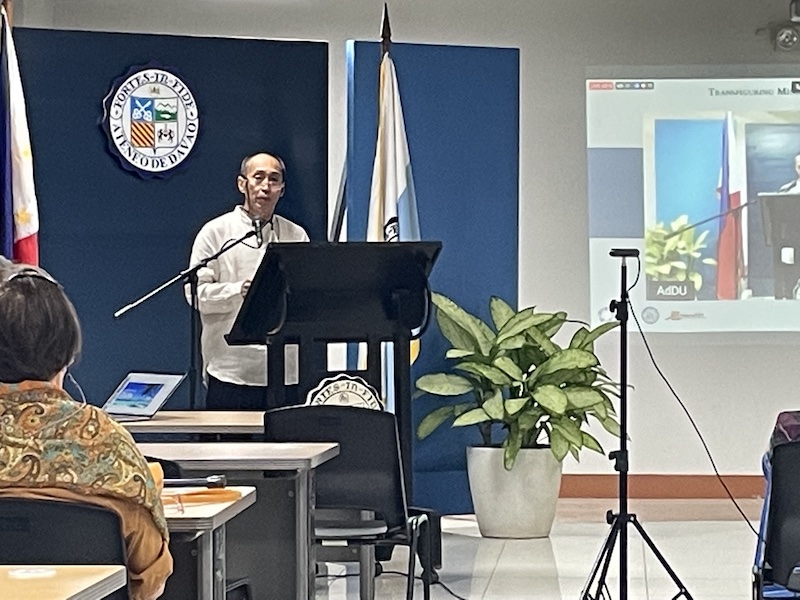(Speech delivered by Joselito Sescon during the launch of the book, Transfiguring Mindanao: A Mindanao Reader at the Ateneo de Davao University on 22 June 2022. Sescon co-edited the book with Jose Jowel Canuday)
Let me say my heartfelt thanks, Maraming salamat po, daghang kaayong salamat, for gracing with their presence in today’s book launch of the Mindanao Reader:
Good afternoon! Maayong hapon sa tanan!
I am to narrate the making of the book. I will do this briefly, but I will add something more on plans for the next few years.

I have been teaching economics courses at Ateneo de Manila for a while, and when I wrote the project proposal for this project in 2017, it was borne from the realization that despite several very good resource materials on Mindanao, I could not find a volume or a Reader that covers most interesting facets of Mindanao. Having been born and educated in Mindanao but mostly have lived and worked in Manila, you come to know the dearth of knowledge of colleagues and people I worked with in Luzon.
With the help of Dean Nandy Aldaba of the School of Social Sciences, we crafted a proposal to tap the Commission on Higher Education’s Institutional Development and Innovation Grant. I presented and defended our proposal in CHED at the height of Marawi siege in 2017 in front of an inquisitive panel headed by former UP President Emerlinda Roman. It probably got the nod of the panel because it is about Mindanao. I remember Dr. Roman with the two other panel members saying “aabangan namin ang paglabas ng Mindanao Reader.” After getting the proposal approved, I naturally approached Jowel Canuday because we need someone who is currently doing research on Mindanao, and like myself must come from the place.
Since Jowel had just finished collaborating with a 2017 exhibition of an infographic of Mindanao Timeline for the Mindanao-Sulu History and Peace Education Project, the idea of a Mindanao Reader fits well. The book is somewhat a written narrative of certain portions of the Mindanao timeline infographic.
In September 2018, we brought the idea of the Mindanao Reader here exactly in Ateneo de Davao University by organizing a conversation between social science faculty members from Ateneo de Manila and Mindanao experts and researchers and faculty here in Ateneo de Davao. From thereon we embarked on the book project, with Jowel and I going back and forth to Mindanao to talk with authors and researchers. We asked key people like Bro. Karl Gaspar here to organize and recruit research writers on the Christian Church. To get a boost of the project, we brought together targeted contributors and authors on July 28, 2019, in a conference in Cebu. From thereon, after the conference, until throughout the pandemic, it was all about the manuscripts and filling in writers for specific chapters. As you have known, we have our full-time jobs as teachers, and with the pandemic, the development of the book project was at snail pace. I sometimes began to doubt if we can ever finish the book. With over 30 plus written manuscripts it was a challenge weaving through the contents and how to come up with a coherent anthology of different but important views on Mindanao, from history, religion, economics, culture, language, ecology, and media. I relied on Jowel to organize the chapters while I concentrated on the technicalities of the editing process. It took two copy editors to edit. Add to the this the administrative tasks of budgeting, expense, liquidation, financial reports, payments, and so on.
Then Dean Nandy Aldaba mentioned that we can tap The Asia Foundation for additional support specifically in the editing process and getting additional chapter authors to fill in gaps in the flow and content of the Reader. Without TAF additional support it would have been very difficult because the CHED support was meant for the preparatory activities such as the series of conversations and the main conference held in Cebu, and small honoraria to contributing authors. The TAF support was very strategic in pushing the book project to the finish line. Our heartfelt thanks to CHED and to TAF in supporting this project.
What’s next?
The idea of a Volume 2 is not far. However, since I am an economist and I also represent the interest of the Department of Economics of Ateneo de Manila, I am biased of what will be the next project. In my department, we have envisioned and dreamed for a more vibrant and professional economists from Mindanao actively engaged in the development economics of Mindanao. We wanted to have more Mindanao economists who understand the history and social complexity of Mindanao. Economists who do not just understand and speak the language of traditional economics, which most people find challenging, but also understand and read the other social science disciplines’ view and analysis on Mindanao. I am diverging a little bit here, because most likely the next Volume will be more on pathways to economic development of Mindanao. Existing literatures on Mindanao economic development were already started by the World Bank and the Mindanao Development Authority through a series of published documents in the last 10 to 15 years.
As a parallel to our efforts on strengthening development research on Mindanao in ADMU, my department is trying to build a fund for scholarship for doctoral degrees in economics for Mindanao students, and we hope we can get more donations and recruit deserving students in our graduate program in economics. In that way we are strengthening our department along with other units of the School of Social Sciences in Ateneo de Manila University to be with Mindanao and its development promises.
Daghang salamat kaayo sa inyong tanan!







